CALL TODAY 646-846-1136 | EMAIL
Surgical Experts Dedicated to Improving Lives
At Lenox Hill Minimally Invasive Surgery PLLC, Dr. Valery Dronsky and his staff of medical professionals provide compassionate care with the highest ethical & professional standards. In our state of the art facility, we offer surgical services using only the most cutting edge and current procedures and treatments. We specialize in general surgery, including extensive experience in performing hernia repair surgery. Our expertise is in minimally invasive surgery and robotic surgery. Minimally invasive and robotic surgery often allow patients to experience easier recovery than traditional open surgery. They also allow for more precise and less traumatic surgery. When robotic and minimally invasive surgery is not an option, we are also skilled and experienced in traditional open surgical procedures.
Dr. Dronsky is an experienced and highly skilled surgeon having undergone extensive training in school, residency and fellowships. He practices medicine with ethical behavior, compassion and superb bedside manner. In the operating room he exhibits precision mechanical abilities, analytical thinking and the ability to visualize tissue in three dimensions. These innate and learned skills allow Dr. Dronsky to be one of the most dexterous and skilled professionals in New York City and the Country.
Call us: 646-846-1136
PATIENT TESTIMONIALS
Recent Awards
We are honored and deeply appreciative to have consistently received prestigious awards and recognition year after year, establishing us as one of New York’s foremost hospitals for a wide range of general surgeries, safety measures, specialized procedures, and overall excellence in healthcare. At Lenox Hill Minimally Invasive Surgery, our unwavering commitment lies in delivering exceptional care and unwavering support to our patients, guaranteeing their safety and successful recovery throughout their entire surgical experience.
Hospital Quality Awards
 America’s 50 Best Hospitals Award™ (2023, 2022)
America’s 50 Best Hospitals Award™ (2023, 2022)
Top 1% in the nation for providing the highest clinical quality year over year.

America’s 100 Best Hospitals Award™ (2021)
Top 2% in the nation for consistently delivering clinical quality year over year.

America’s 250 Best Hospitals Award™ (2023, 2022, 2021)
Top 5% in the nation for consistently delivering clinical quality.

Patient Safety Excellence Award™ (2023, 2022)
Top in the nation for providing excellence in patient safety by preventing infections, medical errors, and other preventable complications.
Specialty Clinical Quality Awards

America’s 100 Best Hospitals for Cardiac Care Award™ (2023, 2022, 2021, 2020, 2019)
Superior clinical outcomes in heart bypass surgery, coronary interventional procedures, heart attack treatment, heart failure treatment, and heart valve surgery.

America’s 100 Best Hospitals for Coronary Intervention Award™ (2023, 2022, 2021, 2020, 2019)
Superior clinical outcomes in coronary intervention procedures (angioplasty with stent).

America’s 100 Best Hospitals for Prostate Surgery Award™ (2023, 2022, 2021)
Superior clinical outcomes in prostate removal surgery and transurethral resection of the prostate.
Click to see all of our Healthgrades best doctors awards
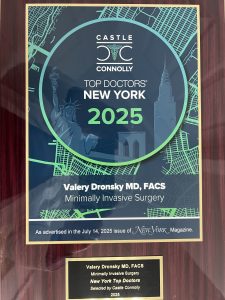
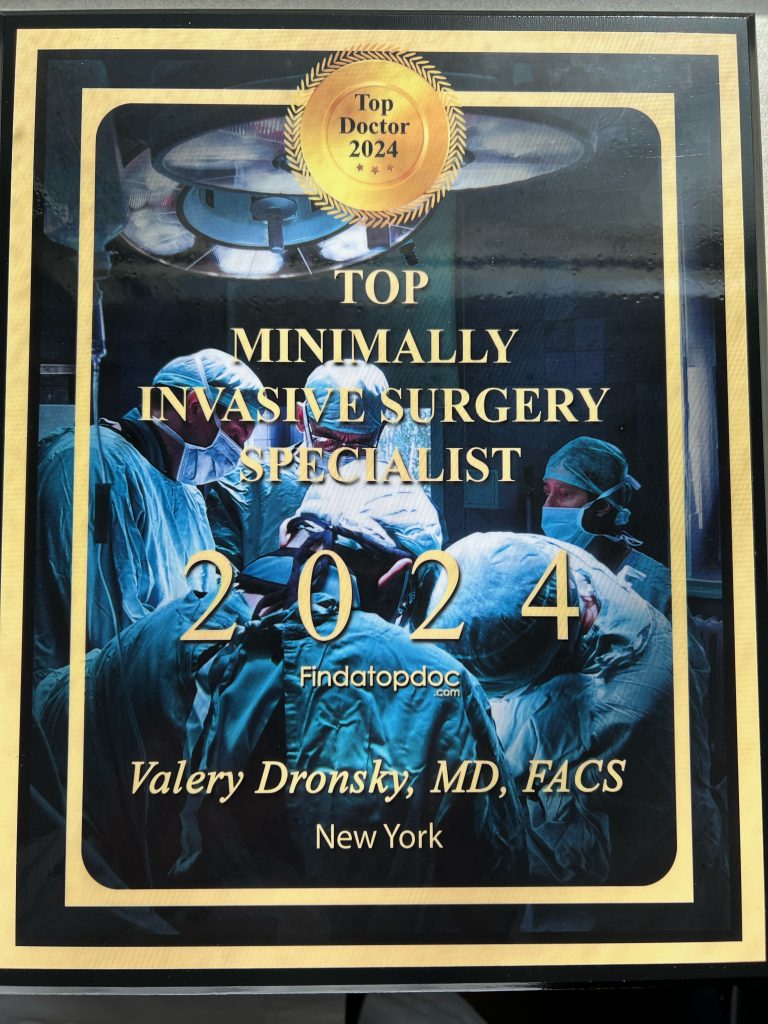
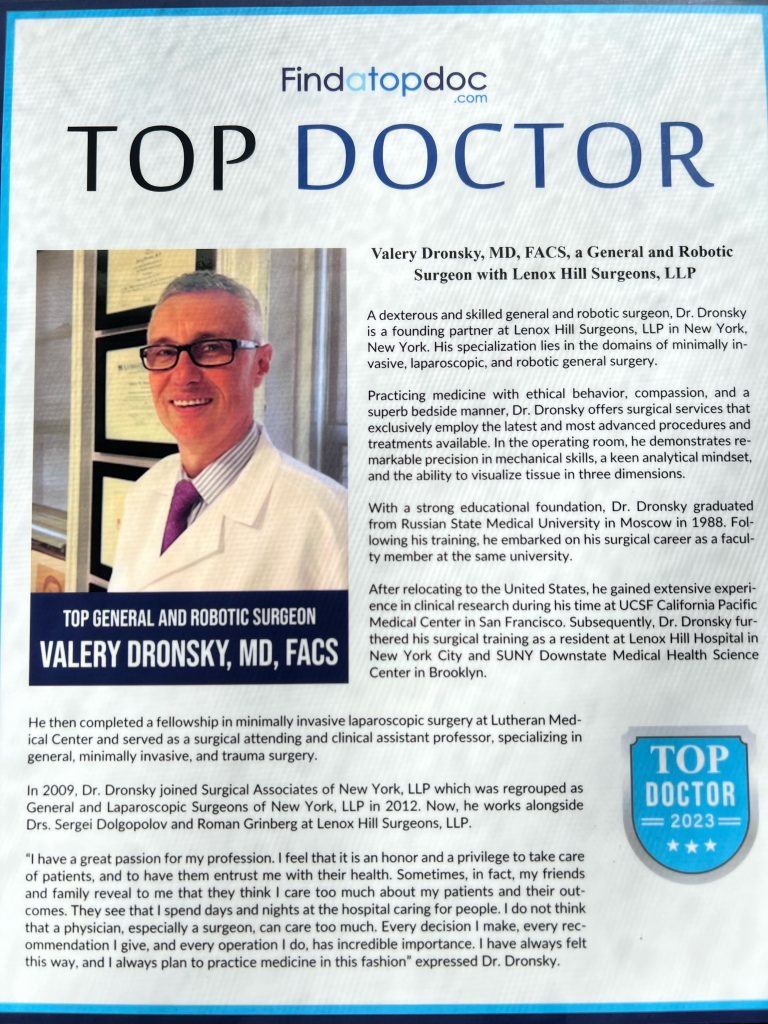


Visit our main website at www.LenoxHillMinimallyInvasiveSurgery.com
Blog Posts are Below:
Tag Archives: Appendicitis
Appendix Surgery: Understanding Appendicitis and Surgical Interventions
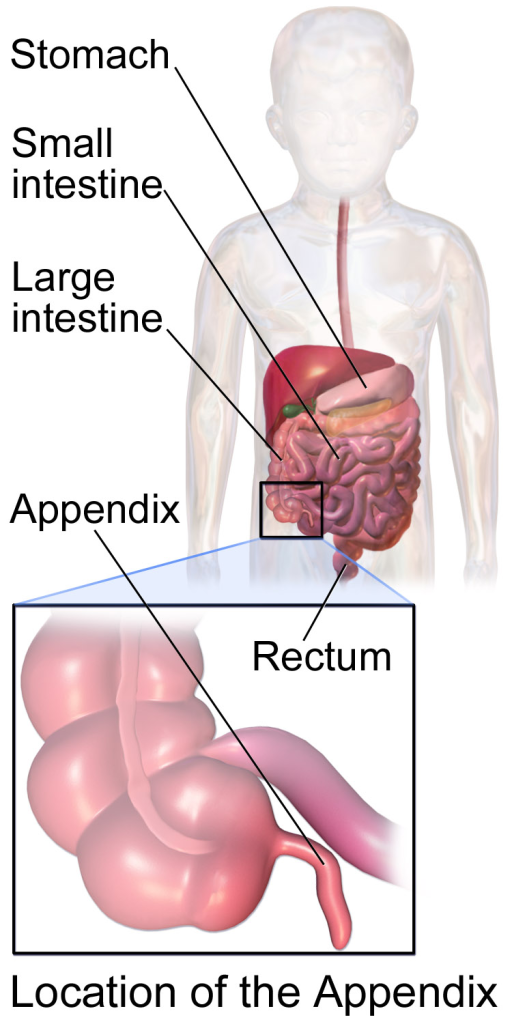 In this informative article, we will explore appendicitis, its symptoms, and the surgical interventions available for its treatment. The appendix may be a small organ in the human body, but when it becomes inflamed, it can cause significant pain and discomfort. Appendicitis is a common condition that often requires surgical intervention to prevent complications. At Lenox Hill Minimally Invasive Surgery, a leading general surgery practice in New York City, our skilled surgeons specialize in appendix surgery.
In this informative article, we will explore appendicitis, its symptoms, and the surgical interventions available for its treatment. The appendix may be a small organ in the human body, but when it becomes inflamed, it can cause significant pain and discomfort. Appendicitis is a common condition that often requires surgical intervention to prevent complications. At Lenox Hill Minimally Invasive Surgery, a leading general surgery practice in New York City, our skilled surgeons specialize in appendix surgery.
Understanding Appendicitis
Appendicitis occurs when the appendix becomes inflamed. The appendix is a small, finger-shaped pouch located in the lower right abdomen. While its exact function is still unknown, it is believed to play a role in the immune system. When the appendix becomes blocked, usually by fecal matter, it can lead to an infection and inflammation.
Symptoms of Appendicitis
Appendicitis typically presents with the following symptoms:
- Pain in the lower right abdomen: The pain usually starts around the belly button and then moves to the lower right abdomen. It may worsen with movement, coughing, or sneezing.
- Nausea and vomiting: Many individuals with appendicitis experience nausea, which may be accompanied by vomiting.
- Loss of appetite: Appendicitis can cause a decreased appetite or complete loss of appetite.
- Fever and chills: In some cases, appendicitis can lead to a low-grade fever and chills.
- Changes in bowel habits: You may experience changes in your bowel movements, such as diarrhea or constipation.
It’s important to note that symptoms can vary from person to person, and some individuals may not exhibit all of these symptoms. If you suspect you have appendicitis, it is crucial to seek medical attention promptly.
Surgical Interventions for Appendicitis
The primary treatment for appendicitis is surgical removal of the inflamed appendix, known as an appendectomy. At Lenox Hill Minimally Invasive Surgery, our experienced general surgeons offer two main approaches to appendix surgery:
Open Appendectomy
During an open appendectomy, the surgeon makes an incision in the lower right abdomen and removes the inflamed appendix. This traditional approach allows direct visualization of the appendix and surrounding tissues. While it requires a larger incision, open appendectomy remains a reliable and effective surgical intervention.
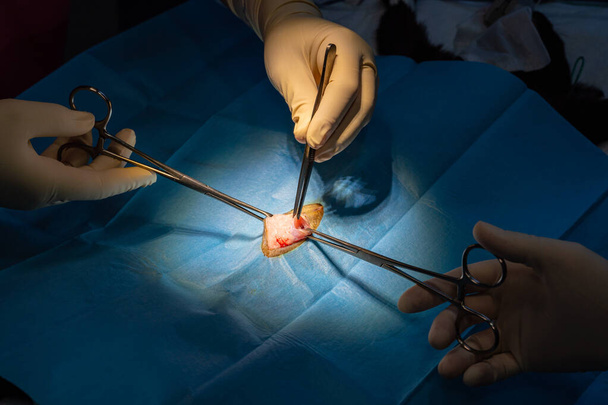
Laparoscopic Appendectomy
Laparoscopic appendectomy is a minimally invasive technique that utilizes several small incisions and a laparoscope, a thin tube with a camera, to guide the surgical procedure. The surgeon inserts specialized instruments through the small incisions to remove the appendix. Laparoscopic appendectomy offers several advantages, including smaller incisions, less post-operative pain, faster recovery, and reduced scarring.
The choice between an open or laparoscopic appendectomy depends on factors such as the severity of the appendicitis, the patient’s overall health, and the surgeon’s recommendation. At Lenox Hill Minimally Invasive Surgery, our skilled surgeons will assess your individual case and determine the most suitable approach for your appendix surgery.
Appendicitis and Surgical Intervention Services at Lenox Hill Minimally Invasive Surgery
When it comes to appendix surgery, trust the expertise of the surgeons at Lenox Hill Minimally Invasive Surgery. Our dedicated team is committed to providing exceptional surgical care with a patient-centric approach. We prioritize your well-being and strive for optimal surgical outcomes.
Contact us today to schedule a consultation and experience the expertise of our renowned surgeons:
LENOX HILL MINIMALLY INVASIVE SURGERY
117 E 77th Street
Suite 1A
New York, NY 10075
646-846-1136
admin@lenoxmis.com
Visit our website for more information: https://lenoxhillminimallyinvasivesurgery.com/
Surgery For The Appendix
Appendix Surgery or Appendectomy involves the removal of appendix after the occurrence of appendicitis. Let’s find out about when you need an appendix surgery, what the procedure involves, and where to get best surgeons for appendectomy.
Why do People Get an Appendix Surgery?
Appendicitis is a serious medical condition that requires an appendix surgery. It occurs due to the infection in the appendix because of growing bacteria or clogging of the stool in the appendix. The infection causes inflammation and severe pain that is only treatable with the removal of the appendix. In the case of an accident or serious injury that causes the trauma and appendicitis, appendectomy is the only surgical option available. Peritonitis is a serious condition resulting from the inflammation of the appendix and can cause the appendix to rupture.
Procedure for Appendix Surgery
First, the surgeon will administer the patient with certain antibiotics to prevent the overgrowth of bacteria. The dose of antibiotics will depend upon the degree of the damage. In the case of sepsis, the patient would have a single dose of injectable antibiotic. If the appendix has ruptured already, the surgery will start without administering the antibiotics.
The patient will undergo general anesthesia before the surgery. For the surgery, there are two common methods; open surgery and laparoscopic surgery.
Open Surgery for the Appendix Removal
The surgeon will sterilize the skin with a germ-killing solution first. In rare cases, the surgeons do need to shave the skin in the appendix area. The surgeon will then cut the skin deeply (2-3 inches) to open the portion of lower abdomen to expose the appendix. If there is some mass growing on the appendix, the surgeon will make incisions on the mass as well.
Beneath the skin, the surgeon will make incision through the layer of protective tissues and abdominal walls to reach the appendix. Once the surgeon identifies the location of the appendix, he/she will carefully cut the appendix and remove it out of the patient’s body. After that, the surgeon will stitch the peritoneum layer, which he/she had previously ruptured for the removal of the appendix. The surgeon will stitch the skin of the lower abdomen.
Minimal Invasive Laparoscopy
Laparoscopy is the recent trend in surgical procedures, which involves cutting certain a part of an organ or removing if entirely. This process involves making three small incisions (of ¼ or ½ inches) to expose and remove the appendix instead of opening a larger portion of the stomach or lower abdomen. This surgery also uses a small camera or laparoscope, which is a mini tv-like monitor to show the appendix and the surgery procedure in an enlarged view. To remove the appendix laparoscopically, our surgeons have special instruments that can easily perform the surgery without any deep incisions.
Advantages of Laparoscopic Appendectomy
Laparoscopic appendectomy has several benefits over the open surgery appendectomy.
- The surgeon will make only a few stitches on the patient’s body. This means the post-operative pain significantly reduces in this procedure as compared to an open surgery.
- The recovery is also quicker.
- The patient achieves the normal functioning of the bowel quickly.
- The hospital stay is lesser for laparoscopic surgery.
- Laparoscopic surgery gives better cosmetic results. The stitch marks do not look horrible.
—
Are you having problems with your appendix? Call us at 212-988-1136 to book an appointment. We have NYC’s best surgeons for laparoscopic appendix surgery. For more information visit our main website.
Appendicitis
Appendicitis is one of the most common factors responsible for abdominal pain, which can lead to surgery. More than 5 percent of people in the US experience appendicitis at some point. However, the pain most often occurs in people aged between 10 and 30.
Appendicitis is the inflammation of a 3.5-inch long appendix tube that protrudes from the large intestine. The condition calls for an immediate treatment, most probably surgery to remove the appendix.
Leaving an inflamed appendix untreated will cause the tube to burst. Thus, the inflamed appendix may start spilling infectious bacteria into the abdominal cavity. And, it may prove fatal sometimes.
Symptoms of Appendicitis
Usually, the first sign of appendicitis is a sudden pain that begins in the upper abdomen and radiates to the lower right portion of the abdomen. The pain may become excruciating when you cough or walk.
The inflamed appendix may cause you to lose appetite, or you may feel nausea or vomiting as soon as the pain begins. Abdominal bloating and low-grade fever, usually 99 – 102 Fahrenheit, may also serve as signs of the inflammation of appendix.
The other symptoms of appendicitis include severe cramps, dull or sharp pain in the back, rectum, or the lower or upper abdomen.
What Causes Appendicitis?
While the root cause of appendicitis remains unknown in most of the cases, doctors believe that inflammation occurs when the appendix is blocked. The obstruction in the lining may occur due to hardened stool, intestinal worms, enlarged lymphoid follicles or cancer.
The blockage in the appendix results in an infection, which may multiply the bacteria. Thus, it leads to the swelling and formation of pus in the appendix, thereby causing inflammation. You may also feel severe pain in the abdominal region, and if not treated timely, the appendix may rupture.
Appendicitis’ Diagnosis
The symptoms of appendicitis are often confused with that of the gallbladder diseases, bladder or urine infection, intestinal infection, gastritis, and ovary problems. This makes the diagnosis of appendicitis tricky. Your doctor may conduct these tests for diagnosing the inflammation in the appendix.
- Examination of the abdominal region: This helps identify the stiffening of the abdominal muscles when the doctor applies pressure on the appendix.
- Rectal Exam: The doctor examines the lower rectum with a lubricated gloved finger.
- Blood Test: The blood tests show a high white blood cell count in the body, thereby indicating an infection.
- Urinalysis: The urine test helps rule out a urinary tract infection or a kidney stone as a possible cause of the pain.
- Imaging Tests: The doctor may require an abdominal X-ray, ultrasound, a CT scan, or an MRI of the patient for the diagnosis of appendicitis.
Treatment: Appendectomy
The standard treatment for all appendicitis is appendectomy, i.e., the removal of appendicitis. The doctor may either perform open surgery or a laparoscopic surgery depending on the severity of the problem.
During the open surgery, the doctor makes an incision, which is usually 2 to 4 inches long. Doctors perform this type of surgery when the appendix has ruptured, and an excess abscess or puss has formed around it. Thus, the doctor drains the fluid and cleans the abdominal cavity.
Once the infection is under control, the doctor may perform minimally invasive or laparoscopic surgery. The surgeon will use some incisions to insert surgical instruments and a video camera into the abdominal region to remove the appendix.
Final Word
Do not neglect the pain that you experience in your abdomen. It may be a sign of an inflamed appendix. If you do not go for a treatment promptly, it may cause your appendix to rupture. Contact Lenox Hill Minimally Invasive Surgery in NYC today and book an appointment with the experts of minimally invasive surgery.















